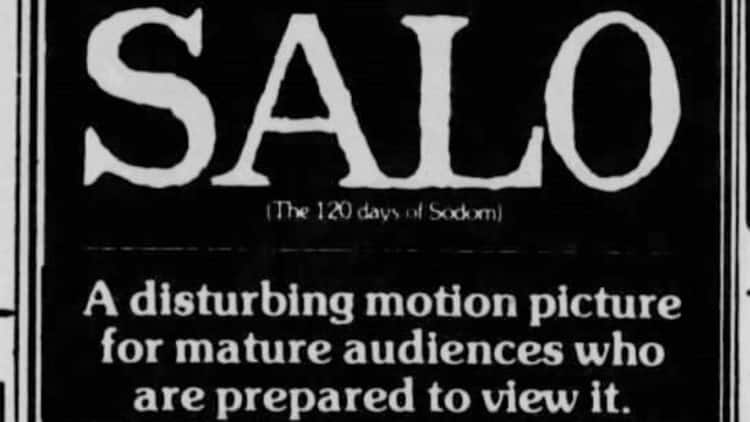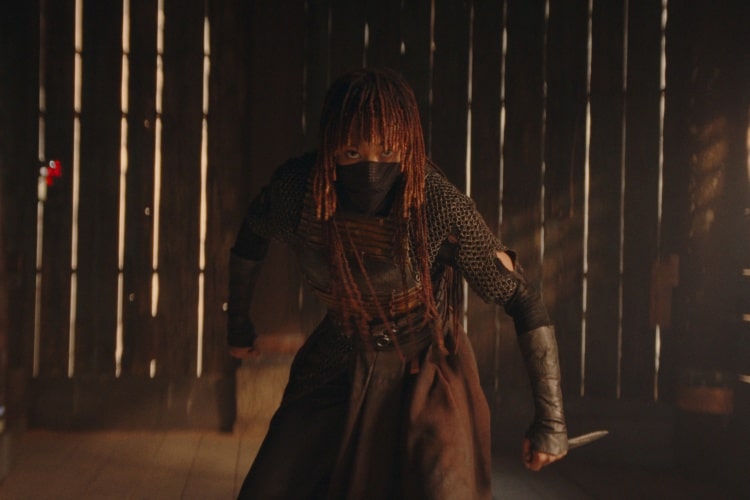THE WEDDING BANQUET
Main Cast: Paolo Bonacelli, Laura Betti
Director: Pier Paolo Pasolini
It has been an absolute disaster of a day. All I can say is that I am collapsed in the home theater with a very large pitcher of sangria and the hopes that things will improve tomorrow. It all started out sweetly enough with several hundred of the creme de la creme of Hollywood royalty arriving at Chateau Maine in order to attend the nuptials of that queen of stage and screen, Neely O’Hara. There was a bit of a hiccup at the beginning as I got a call that her groom, the Sultan, had been delayed in customs but was sure to be there for the ceremony. The appointed hour arrived. Still no groom. The flowers were starting to wilt on the lovely backdrop in the shape of Shari Lewis’ beloved Lambchop that Mr. Ray, my florist had placed behind the altar in order to be sure that the ceremony was compliant with Shari’s law. The guests were becoming restless so I had the catering staff pass out even more rounds of cocktails with custom designed swizzle sticks in the shape of Catherine of Aragon, supporting our medieval princess theme.
I was just beginning to think that the Sultan had stood poor Neely up when there was a squeal of tires in the drive and a limo pulled in, laying quite a track of rubber that will have to be scrubbed off the travertine marble of the flagstones. Out leaped the Sultan, in exquisite robes and turban and he hurried up to the altar. I immediately cued the orchestra who broke into a madrigal arrangement of The Indian Love Call and Neely made her entrance in a fantasy of strapless white tulle via zipline from the top of the library wing tower, landing lightly beside her groom. The officiant, some aging Englishman named Ian who looks suspiciously like Gandalf and who apparently has made some sort of career out of celebrity weddings, had only just got out ‘Dearly beloved’ when the Sultan began to jabber like crazy at poor Neely, obviously outraged by something. I caught something about Sharia, obviously a reference to the departed Miss Lewis, and his security team were all of a sudden bundling poor Neely into some sort of hideous black burlap burqa.
There was a huge struggle and soon the Sultan, security goons, Neely and Ian were all flying about. A couple of goons hit the golden toilet tower I had constructed at Neely’s request, in order to out Kanye Kanye, and the joints didn’t hold too well. (They must not have used industrial strength hot glue). The porta-potties came apart and tumbled into the assembled guests splashing a great number of them with an excess of ordure. I was running around with a spare tablecloth wiping people down (except for Lindsay Lohan. Her appearance was actually improved.) and missed the end of the ceremony but I am told the wedding was completed, the Sultan, of some place called Brunei, bundled Neely into the limo with comments about her becoming a jewel in his harem, and the whole crowd took off. Those of us who remained, drank too much, ate from the half of the buffet that the porta-potties missed, while Normy called Serv-pro to deal with the mess.
I needed to find a film about a house party with a more disastrous end than this particular wedding fiasco and all I could recall was Pier Paolo Pasolini’s disturbing masterpiece from 1975, Salo, or The 120 Days of Sodom. Fortunately, I had picked up the Criterion Collection’s restoration on DVD on one of my last trips to my local Barnes and Noble. I topped off Normy’s and my sangria glasses and turned it on while the Serv-pro crew continued cleaning the back terrace.
Pasolini is a fascinating figure in 20th century Italian culture. His films, poetry, essays and other works all had an enormous subtext critical of consumerism, the globalization of the economy, the destruction of local arts and belief systems in favor of corporate and statist expression and he was an ardent communist and one of the major defenders of the student uprisings of the 1960s. Much of what Pasolini feared has come to be in the decades since his untimely death (murdered at the hands of a male prostitute but possibly assassinated by government agents due to his provocateur nature) and his work is therefore more timely than ever.
Salo, his last film, was adapted from the Marquis de Sade’s famous erotic novel, The 120 Days of Sodom, written in 1785 but unpublished until the 20th century due to its intensely sadomasochistic themes. Pasolini took the material and translated it to the end of World War II, when the Italian fascist state was collapsing and the remaining government relocated to the small town of Salo. Four middle aged men representing the power structure, known as the Duke, the Bishop, the Magistrate and the President, decide to indulge themselves and all of their fantasies in an isolated villa. They hire four brothel madames, three to tell erotic stories to their assembled company and one to provide musical accompaniment and kidnap a selection of attractive teens, male and female, from local towns and war orphanages, making them their prisoners. They also have a number of armed fascist guards to make sure none of their unwilling guests escapes or violates their capricious rules.
Using every device of psychological and physical torture their depraved minds can conjure up, the men methodically dehumanize their victims through sexual abuse, leading them ever downward through the circles of hell, helpfully titled by the filmmaker as circle of manias, circle of shit and circle of pain. The viewer is sucked in and uncompromisingly taken along on their infernal descent, a journey so real that at times it is difficult to remember that this is just a film. The viewer is made to be a voyeur to scenes of casual brutality that are shot in a cinema verite style which have left critics sharply divided for the last four decades. The film has been routinely banned in many countries and has ended up on best films lists as well.
This is not a film to like or dislike. It’s too visceral an experience and there are parts that once seen, cannot be unseen or forgotten. (Like a certain banquet bearing a strong resemblance to my back terrace following the collapse of the golden toilet tower). It creates strong emotional responses which is exactly what Pasolini intended. He created it as an indictment of inequality and the corrupting influences of power. The events of the last decade, with the growing imbalances in this country in politics and economics, makes the film more timely than ever. It is all too easy to imagine The Wolf of Wall Street crowd taking their behaviors to their logical extreme and creating such a horror show.
The Criterion DVD has the full film (120 minutes – the original cut was 145 minutes but was shortened by Pasolini shortly before his death for reasons of pacing). It also contains several documentaries about the making of the film and about Pasolini himself and his philosophies and how Salo fits into his body of work. The behind the scenes aspects helps the viewer of the film place things back into the context of ‘It’s only a movie’ and for that reason alone, I recommend them. It’s a film that cinephiles should see and that those with strong interests in the uses and abuses of power should at least be aware of. It is definitely not for everyone and anyone who goes into it thinking that it’s some sort of European high art pornography is going to be in for a rude shock. Yes, there are a lot of attractive naked young bodies but sex is used strictly as a weapon, and not as an expression of love or affection. The few erotic moments that express any sort of tenderness end very badly.
Imperiled orphans. Spooked servants. Designer couture. Inappropriate foods. Public humiliation. Assassinated collaborator. Gross mutilations. Soldiers waltz.

Originally from Seattle Washington, land of mist, coffee and flying salmon, Mrs. Norman Maine sprang to life, full grown like Athena, from Andy’s head during a difficult period of life shortly after his relocation to Alabama.






Leave a Reply